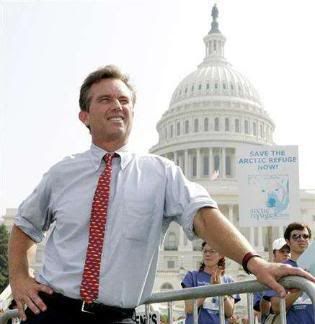Kennedy encourages protection of environment in address at HSU
Thursday, October 18, 2007 / DailySiftingsHerald AR
Environmentalist Robert F. Kennedy Jr. speaks on "Our Environmental Destiny" Wednesday night at Henderson State University.
Democracy and environmental issues are intertwined, Robert F. Kennedy Jr. said Wednesday night at Arkansas Hall. "A democracy is judged by the way it distributes its resources," he said.
Kennedy is president of Waterkeeper Alliance,
 a non-governmental organization that promotes clean water throughout the world. He also serves other environmental groups, as well as serving as the chief attorney for the National Resource Defense Council.
a non-governmental organization that promotes clean water throughout the world. He also serves other environmental groups, as well as serving as the chief attorney for the National Resource Defense Council.Calling environmental injury "deficit spending," Kennedy explained that all mankind loses if the environment is continually damaged.
Families can no longer enjoy the experience of going fishing and then frying up the catch for supper. "You can't eat the fish in the lakes and rivers in Arkansas" due to high levels of mercury, Kennedy said. "This is true all over the country because of industrial waste released into our waterways."
High levels of mercury have been linked to numerous birth defects, including autism and mental retardation. Scientists have proven that high mercury levels in women contribute greatly to a drop in children's IQ, as much as 10 points or more, he said.
"We've got to start protecting our environmental infrastructure," Kennedy said. If people don't start thinking about the depletion of resources, there soon will be no more resources, he said. "We have to look at the gross impact of American industry on the environment."
The United States had been making progress, Kennedy said, with the Clean Air Act and other laws, but those have been weakened and diluted with legislation passed during the current administration, Kennedy said.
Work that took citizens 200 years to accomplish has been diminished in seven years under President George W. Bush's leadership, Kennedy said. "He is the worst environmental president we've ever had," Kennedy said.
Bush has appointed persons to lead environmental agencies who had only ulterior motives, Kennedy said. For example, the head of the Environmental Protection Agency is a former utility lobbyist, he said. The man appointed to oversee the Forestry Division of the EPA is a former timber lobbyist.
Changes in industrial regulations have resulted in nothing but more profits for some, lower quality of life of others and a damaged environment for all, he said. He spoke of new methods of mining coal that almost eliminate the need for human workers and destroy the environment. The method involves using explosives to tear off the tops of mountains to reveal the coal underneath. Large machines then scoop out the minerals.
All the rocks, dirt and other waste is just left where it falls, in lakes, rivers, streams, etc. "It's not just destruction of the environment, it's subversion of the democracy," he said.
Kennedy also blamed the media for much of the misinformation being distributed. The decline began in 1988 when former President Ronald Reagan abolished the Fairness Doctrine, the origins of which can be found in the Magna Carta.
The Fairness Doctrine stated that all media had to include news of public import, tell both sides of the story and allow local and diverse control.
Reagan abolished the Act "as a favor to Christian right-wing groups and big corporations," Kennedy said.
Now, five companies own most of all media outlets in the United States. "News is now for profit," not to inform the public. "We don't know what's going on around the world because the only place you can get it is the BBC," Kennedy said.
The main purpose of news now is to entertain, not inform. "We know more about Tom (Cruise) and Katie (Holmes) than about global warming," he said.
He quoted a survey which asked both Republicans and Democrats about their views. The first survey asked only about their political affiliation. The second asked about their news sources.
The surveys revealed that all participants had mostly the same opinions on issues. The political parties made no difference. The source of information was the deciding factor, Kennedy said. "The values are no different. The information is."
Admitting that he and others with his beliefs are often called "tree huggers" and worse, Kennedy maintains that there's "nothing radical about protecting the environment." He said it's common sense. "Protecting the environment is about us," he said, not about saving birds, fish and wildlife. Increased habitat for wildlife is a happy by-product of protecting the environment, he said.
1 comment:
People should read this.
Post a Comment